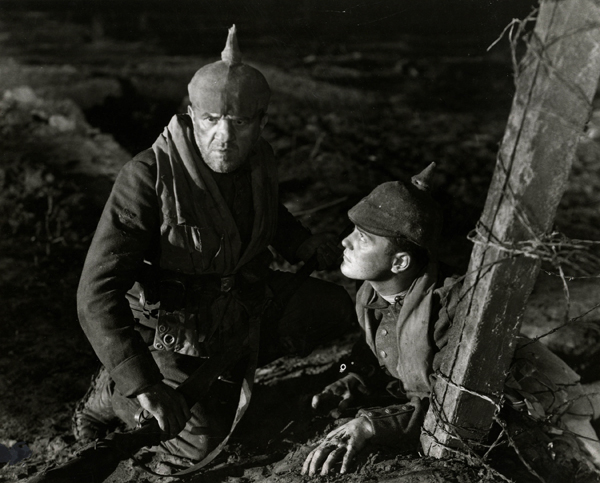These notes accompany screenings of Lewis Milestone’s </i>All Quiet on the Western Front, July 28, 29, and 30 in Theater 1.</p>
Lewis Milestone (1895–1980) was born Lev Milstein near Odessa, Ukraine. He immigrated to America in 1913 and served in the photographic unit of the Army Signal Corps during World War I. He began working in Hollywood in 1919, and directed his first film in 1925. Even before his Oscar for All Quiet on the Western Front (1930), he had won a “Best Comedy Direction” statuette for Two Arabian Knights (1927), beating out Charles Chaplin’s The Circus.
Like his fellow Russian émigré Rouben Mamoulian, however, Milestone’s early promise was never truly fulfilled. His early talkies (after All Quiet) were helped along by structure provided by Ben Hecht and Charles MacArthur (The Front Page) and Somerset Maugham (Rain), and Al Jolson was more bearable than usual in Hallelujah, I’m a Bum. The General Died at Dawn</i> (as with Mamoulian’s Song of Songs) was ersatz, but inferior, Josef von Sternberg, and his two Steinbeck adaptations (Of Mice and Men and The Red Pony) are watchable, but many of his later films tend to be forgettable. World War II provided the opportunity to rejuvenate the reputation he had established with All Quiet, but Edge of Darkness, The North Star, The Purple Heart, A Walk in the Sun, Arch of Triumph (another adaptation of a novel by All Quiet author Erich Maria Remarque), and, later, Halls of Montezuma only intermittently tipped the scales in Milestone’s favor. Similarly, the Korean War resulted in what was just another war film, Pork Chop Hill. A career “climaxing” with the Rat Pack’s version of Ocean’s 11 and Marlon Brando’s Fletcher Christian in Mutiny on the Bounty doesn’t lend much to the argument that Milestone had a coherent worldview. Andrew Sarris had it right when he said that Milestone “is almost the classic example of the uncommitted director.”
Hollywood could hardly have been more jingoistic in the period surrounding the First World War. On the movie screen, spies of many nationalities seemed to be swarming everywhere, and it is a wonder that Erich von Stroheim, the archetypal celluloid Hun, ever had time to sleep. However, by the time of King Vidor’s enormously popular The Big Parade (1925), the film industry found it safe to question whether the war was such a good idea after all. America was returning to its isolationist roots, a process hurried along by the Great Depression, resulting in President Hoover’s 1932 order that General MacArthur disperse the “Bonus Army” of disillusioned veterans. Thus, the arrival of the pacifist All Quiet on the Western Front in 1930 could not have been timelier. On top of the worldwide success of Remarque’s novel, the film made lots of money. In addition to Milestone’s directing Oscar, it won for Best Picture was nominated for screenplay and cinematography. Some of the credit for the film’s fine acting should probably go to dialogue director George Cukor, a recent recruit from Broadway who began directing his own films that same year.
A recent report suggests that a remake is in the works with Daniel Radcliffe (Harry Potter) in the Lew Ayres role. (Radcliffe has already died once in the World War I trenches, playing Rudyard Kipling’s son in My Boy Jack.) Presumably, the remake will remain faithful to the original and the novel, casting a cold eye on warfare. This, however, was a problem for Lewis Milestone eighty years ago, and it remains a problem today. There is an inevitable pageantry to cinematic warfare that works against whatever pacifist intentions the filmmaker may have.
Milestone and his trio of top cameramen’s—Arthur Edeson, Karl Freund, and Tony Gaudio—facility for capturing battle’s intrinsic spectacle is such that, in Sarris’s words, “the orgasmic violence of war is celebrated as much as it is condemned.” For me, the most accomplished pacifist film set during World War I is Joseph Losey’s King and Country (1964). It is bleak, laid back, and almost nonchalant in its acceptance of the grim reality of war. Tom Courtenay’s character in the latter film is a clear descendant of Lew Ayres—a nobody and an Everyman, a young man tragically caught up in the mindless irrationality of nationalism and patriotism.


